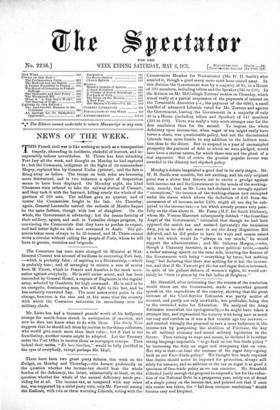There have been two great party debates this week on
the Budget, on Monday and Thursday,—the former professedly on the question whether the income-tax should bear the whole burden of the deficiency, the latter, substantially at least, on the .question whether the whole of the annual deficiency needs pro- viding for at all. The income-tax, as compared with any other Lax, was supported by a strict party vote, only Mr. Fawcett among the Radicals, with two or three wavering Liberals, voting with the
Conservative Member for Westminster (Mr. W. H. Smith) who assailed it, though a good many more must have stayed away. In this division the Government won by a majority of 85, in a House of 590 members, including tellers and the Speaker (335 to 250). In the division on Mr. McCullagh Torrena' motion on Thursday, which aimed really at a partial suspension of the payments of interest on the Terminable Annuities (i.e., the payment of the debt), a small handful of advanced Liberals voted for Mr. Torrens and against the Government, leaving the Government in a majority of only 46 in a House (including tellers and Speaker) of 547 members (294 to 248). There was really a very much stronger case for the first resolution than for the second. To impose the whole deficiency upon income-tax, when sugar or tea might easily have borne a share, was questionable policy, had not the discontented Liberals been more hostile to any addition to the indirect taxa- tion than to the direct. But to suspend in a year of unexampled prosperity the payment of debt to which we were pledged, would have been a craven course, for which there was not the ghost of a real argument. But of course the greater popular favour was awarded to the dilatory and slipshod policy.
































